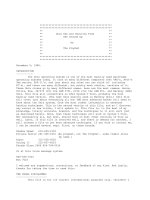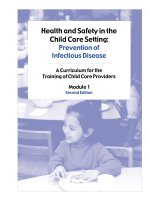TIPS, TRICKS AND SECRETS FROM THE SKIN CARE EXPERTS
Bạn đang xem bản rút gọn của tài liệu. Xem và tải ngay bản đầy đủ của tài liệu tại đây (428.87 KB, 61 trang )
TABLE OF CONTENTS
Introduction: Oh, Those Dreaded Zits! ................................................................. 3
Understanding Your Skin ...................................................................................... 7
Common Facial Blemishes ................................................................................. 12
So What Causes Acne?...................................................................................... 18
So Just Cleanse and Cleanse and Cleanse Some More, Right? ........................ 24
Acne Medications and Treatment Options .......................................................... 30
Making Your Own Natural Cleansers and Masks................................................ 34
Your Diet, Your Physical Activity Level, and Acne .............................................. 37
The Connection Between Teenagers, Hormones, and
Everything Else That Causes Their Acne ........................................................... 43
The Proper Way to Take Care of Your Skin........................................................ 47
The Worst Things to Do For Acne and Breakouts............................................... 53
Other Treatments for Acne ................................................................................. 57
Conclusion: You Can Improve Your Acne.......................................................... 61
2
INTRODUCTION:
OH, THOSE DREADED ZITS!
Zits. Pimples. Splotchies. Pizza face.
Okay, that last one was a bit
cruel but chances are, if you
have acne or have ever
been
faced
(no
pun
intended) with this condition,
you've heard that and
probably much worse.
It's easy for those without
acne to make light of the
condition; after all, aren't
there more serious health
concerns that one could
have? The cold hard truth is
that this may be true; a
person
would
probably
rather have acne than
cancer, heart disease, an
amputated
limb,
be
paralyzed, and so on, but
that doesn't mean that one
should make light of this
condition either.
Acne can be very unsightly and leave
permanent scars.
UNDERSTANDING THE IMPACT OF ACNE
Acne is actually a condition that can greatly affect one's self-esteem and
confidence and can even interfere with one's everyday life. Persons without this
condition may have a hard time understanding that, but think of it this way.
Suppose you were in a severe car accident that left huge gashes and cuts across
your face. The resulting surgeries did little to correct this, so now every time you
look in the mirror all you see are those deep, horrendous scars. How would you
feel every time you greeted someone or just left your home? You would no
3
doubt be incredibly self-conscious, assuming that every person you came into
contact with was immediately turned off by this defect.
People with severe cases of acne can feel much the same way. Every time they
look in the mirror, all they see is their acne regardless of what other features they
may have. They often assume that other people view them the same way they
would that person that is disfigured in a car accident - as if all anyone can see is
their defect and nothing else.
This is rarely true of course. Usually those with acne are far more aware of it
than those around them, but those feelings that an acne sufferer has should be
taken into account. If they feel their condition is important enough or severe
enough to warrant intervention, then it should be just as important to those
around him or her and those responsible for their care.
WHEN A CHILD HAS ACNE
Parents sometimes assume that their child will just grow out of their acne and
easily dismiss the condition as yet another dramatic event that teenagers are
blowing all out of proportion, but if you are that parent, put yourself in his or her
shoes. How would you feel if you were in that car accident and your doctor just
dismissed your concerns? Or if your spouse just rolled his or her eyes every
time you talked about how you felt about your disfigurement?
It may be true that in some cases, a child or teenager will outgrow the acne but
even if they do, to them it's a reality that needs to be dealt with right now. They
may also be facing ridicule and teasing from classmates about the condition, so
getting no support from someone at home doesn't help the situation at all.
EVEN MINOR ACNE CAN HURT
And certainly your acne doesn't need to be that bad for you to be concerned
about it. Even just a few minor breakouts here and there can be frustrating and
make you very self-conscious, especially if they happen right when you want to
look your best! That important date or presentation in front of colleagues or class
reunion is not the time to have pimples all over your face! You're under enough
pressure during these times and don't need the distraction of trying to figure out
how to get rid of those splotchy bumps.
Often we obsess about any little pimple or zit, or any imperfection for that matter,
whether others are aware of it or not. Even just one small pimple can be enough
4
to send us into a tizzy, wondering if people are staring and laughing at us behind
our backs.
TREATMENT AND PREVENTION IS POSSIBLE
Treating acne and preventing it from happening in the first place is not that
difficult and really can be done by anyone. It doesn't necessarily require doctor
visits or expensive creams and topical ointments, although a trip to the
dermatologist's office shouldn't be ruled out either. Sometimes there are good
things in those treatments you see on pharmacy shelves or advertised online that
can really help your skin to clear up and to stay that way.
But at the same time, a person can easily make many mistakes when trying to
treat their acne, mistakes that actually make the condition even worse and that
aggravate any breakouts you may be having.
Clearing up your acne is just half the battle. You want to have skin that looks
nourished, fresh, clean, soft and supple. While some people are naturally born
with good skin and can thank their parents and grandparents for this, others have
found that they can actually get good skin by taking care of it. It's much like how
you may not have been born with good muscle tone and a flat stomach, but
anyone can exercise and lift weights and be mindful of their diet and wind up with
a good figure or great muscle tone, if they work at it.
Your quest for clear and healthy skin is not one you need to take alone. We've
talked to many experts in the field of skin care and have done all the research for
you. In this book we will:
Explain just what causes acne in the first place, including the myths
about hormones, diet, and the dreaded teen years as well.
Talk openly and frankly about what mistakes you might be making
that are causing you to break out or that may be aggravating your
acne as well.
Clue you in on the best way to take care of your skin, and this
means not just for clearing up acne but for keeping it healthy, clean,
and moisturized as well.
Explain the different ingredients in various acne treatment options
so that you can better understand which ones work and which are
typically useless, and can also understand when they actually may
be doing damage to your skin.
5
Acne is no fun for anyone, children or adults. But it doesn't need to be a fact of
life either. It can be addressed and treated once and for all, and you can live
your life acne-free.
If you're ready to do just that, then let's get started!
6
UNDERSTANDING YOUR SKIN
Do you know what the largest organ in your body is?
That's right, it's your skin. Your skin is actually one large, living organ that serves
many different functions in your body's overall health and protection.
While skin can be absolutely beautiful to look at - imagine someone glistening in
the sun or the innocent radiance of a baby's rosy cheeks - the skin can also have
problems all of its own. Some of these problems are minor irritants, such as a
few patches of dry skin here and there or calluses on the bottom of one's feet.
But sometimes skin can have other problems that are more than minor irritations;
they can be painful, dangerous, and downright unsightly.
One of those common problems when it comes to skin is acne. While we
typically think of acne as being a teenager's concern, it's true that acne can strike
anyone at any time, and can be the result of factors other than those dreaded
teenaged hormones.
But before we start discussing acne, its cause, and its treatment options, let's
take a closer look at the skin itself and find out more about this amazing organ.
Once we do that we can be in a better position to understand the root causes of
acne and the options one has to address it.
FUNCTIONS OF THE SKIN
The skin has many more functions than to just look good and to hold our clothes
in place; as a matter of fact, without skin we couldn't exist. Let's take a look at
the many different functions of our skin to get a better understanding of why it's
important to take care of it and how problems with it can arise.
Keeping stuff where it belongs.
The most obvious function of the skin is to keep all of our innards where they
belong. Without skin we'd need to use rolls of duct tape or plastic bags to keep
all our intestines and other organs inside! The human body is one self-contained
functioning machine and the skin is imperative for that process of containment.
7
Just like a car needs its outer shell to keep the engine, transmission, and other
parts of it in place, the body needs the skin to keep everything in one place as
well.
This isn't to say that all of our internal organs and other elements inside of us are
just resting in the skin the way garbage rests inside of a plastic bag. Muscles,
tendons, and ligaments are attached to bone and of course all of the intestines
are attached to one another and folded up neatly to stay tucked in. Everything
else is attached to something, but in truth, the skin keeps everything in place and
upright. It acts as one final safety feature to keep all those organs and
everything else right where they're supposed to be.
Insulation.
Imagine going outside in the freezing cold without a jacket, or keeping your
house windows open in the cold weather. You need that insulation of a jacket to
keep your body heat in and keep you warm, and you need to close your windows
to keep your home's heat right where it belongs. Your skin is much like that
jacket; your body produces its own heat and warmth the same way a furnace
produces heat for your home, but without your skin your body heat would just
quickly escape the way your home's heat would escape if your windows were
open.
Realizing that the skin acts as insulation for your body heat should give you a
first clue as to how thick your skin really is. While it can get cut or gashed
somewhat easily, it's not just a thin wafer resting on your bones. The skin has
several layers to it and these layers on top of one another are thick enough to
keep body heat in on a regular basis and even in the coldest of weather.
Protection.
Do you know why cars have windshields? The answer is somewhat obvious; to
keep bugs from getting into your teeth and dirt into your eyes and face. That
windshield is a protection for the driver and passengers in the car from all those
outside elements.
In much the same way the skin acts as a protection against all those outside
elements that could easily bombard us every day. It keeps out not just bugs but
dirt, dust, germs, and bacteria. Our skin is designed in such a way that it also
acts as something of a bumper against things. Your car has bumpers so that
when it hits something else, the bumper absorbs a lot of that impact and your
car's vital components, including the engine, transmission, and even the
passengers, are protected. Your skin is like that bumper in that it can come into
8
contact with things and protect the vital organs from being hit and damaged.
Your muscles and bones are protected against tearing, rupturing, bruising, and
breaking because of your skin and its protection.
The skin also protects internal organs and other elements from the sun, wind,
and rain. The skin is designed to absorb or be impervious to these things; the
sun on your face or arms is relatively harmless for small amounts of time, as is
wind and rain. But if your heart or lungs were to come into contact with sunlight
or wind, they would no doubt be irreparably damaged!
Traction and movement.
Have you ever had grease or lotion on your hands and then tried to pick up
something? It probably slipped right through your fingers. Or maybe you tried to
open a jar and couldn't get a firm enough grip.
The skin acts as "grippers" for not just picking up and holding things but for all
sorts of movement. If we didn't have those indentions on our hands and feet that
we call "prints" we would slide around in our shoes and be unable to lift a glass
or anything else for that matter. While the skin in most parts of our body is
somewhat smooth, it still provides some form of traction inside our clothes and
against other materials. It keeps up from slipping out of chairs and allows us to
move freely, hold things, sit in a seat, and so on.
COMPOSITION OF THE SKIN
So maybe you're convinced by now that the skin isn't just some wafer resting
over our bones and innards but is much more complicated than that.
If you're interested in how to fix problems that arise in the skin including acne,
blackheads, and so on, then it's good to know what the skin is made of. By
understanding its composition you have a better idea of what can go wrong with
it and how to fix those problems; you might liken this to getting a basic
understanding of how your car works so that you can better understand those
minor problems that go wrong with it.
You don't need to be a dermatologist to understand basic problems with your
skin any more than you need to actually be an auto mechanic to understand how
to take care of your car. Just a few basic facts can go a long way to realizing
how to take good care of your skin.
9
Layers of the skin.
Are you familiar with
the
Greek
dessert
baklava?
It's made
with what's called filo
or phyllo dough, which
is a paper-thin type of
dough that is stretched
almost to the breaking
point and then folded
and folded over and
over again. Because
it's folded into layers it
becomes very thick
even
though
each
individual
layer
is
incredibly thin.
The skin is something
like this; although it's
not exactly folded, it
has many different layers to it that make it as thick as it is. Each layer is
incredibly thin but when stacked on top of each other it's much thicker overall.
Understanding the layers of the skin is important in understanding why we get
certain flaws and imperfections in our skin, since many of these imperfections
originate in different layers. If we can understand why there are different layers
and what each one accomplishes then we can better address those
imperfections and flaws at their source.
There are three primary layers of the skin: the epidermis, which is the outermost
layer of the skin; the dermis, and the hypodermis.
The epidermis or outer layer of the skin is very unique in that it contains no blood
vessels but is nourished by capillaries underneath it. This layer of the skin keeps
water in the body, constantly acts as a barrier from chemicals and harmful
elements in the atmosphere and protects the body from infection.
Underneath the epidermis is what is called the reticular region, in which is
located the roots of the hair, sweat glands, nail beds, and blood vessels. Many
skin problems including acne originate in this particular region of the skin.
10
This may have been far too much about your skin than you ever wanted to know
but these things are important to understand for the care and health of your skin
overall, and to avoid not just acne but other problems as well. For example,
stretch marks on a person that is overweight or pregnant usually originate in the
reticular region because of the pressure put on blood vessels when skin is
stretched past the area that it's supposed to be. These blood vessels close up
and this results in scarring of the skin.
It's also important to understand how thick the skin is and where certain
imperfections and problems occur because often we wonder why creams,
ointments, and other topical medications just aren't doing the job we expected
them to do. This is often because these topical treatments just don't reach far
enough into the layers of the skin to do any good the way they're supposed to.
By learning how thick the skin really is we have a better understanding of what
works and what doesn't when it comes to all blemishes, including acne.
11
COMMON FACIAL BLEMISHES
Everyone gets blemishes on their face; even the most beautiful Hollywood movie
star has had to deal with some imperfection somewhere, some time. That's why
dermatologists and plastic surgeons do so well in the movie industry - they work
very hard on behalf of their clients to fix these problems once they happen or
help them to avoid them altogether, keeping the audience and fans in the dark
about what those flaws and blemishes are!
Learning more about common facial flaws and blemishes is good for anyone
that's trying to clear up acne, as often these flaws and blemishes are related or
have the same root cause. If we can better understand all the problems that our
skin can face then we can be in a better position to have healthy and radiant skin
overall, and cure not just our acne but all our facial blemishes as well.
ACNE
Acne is actually a disease or outbreak that occurs in the hair follicles of the skin;
when these follicles become blocked, a small bump appears that we refer to as a
pimple. This blockage and resulting bump means that dirt, oil, dead cells, and
other such elements get caught in this area and result in that inflammation or
dreaded pimple.
Skin is a living organ and needs oxygen and blood circulation to keep it healthy,
but unlike other organs it also needs to "breathe" or to keep itself free from these
irritants. These blockages of the follicle and capturing of oil, dirt, and other
elements is not natural and not healthy, and this is why an eruption occurs.
12
Common look of acne.
BLACKHEADS AND WHITEHEADS
You may have seen these small eruptions on your face or other areas of the body; small
bumps we call blackheads or whiteheads are actually forms of acne. When that
gathering of materials has an open face to it, it is usually dark in nature since we can see
the dirt and oil being captured inside. These we refer to as blackheads. When the top of
it actually closes up or forms underneath a small layer of skin, this is called a whitehead
and the most common form of what we refer to as acne.
So when it comes to blackheads and whiteheads, it's easy to think of them as being
something different than your regular acne but in reality they are the same; if we
understand how to treat and address our acne we can better understand how to address
these two problems as well.
CYSTS
Sometimes we confuse cysts with acne since they are usually white and bumpy.
The look quite a bit like whiteheads, but unfortunately a cyst is something more
involved than typical acne.
13
A cyst is a small, closed sac or pocket that has a distinct membrane and division
on the nearby tissue. A cyst may contain air, fluids, or other materials.
It's not unusual for a person to develop cysts not just on the skin but inside the
body as well. It's not unusual for women to develop cysts in their breasts or their
reproductive system, and men develop internal cysts in many areas and systems
as well.
Typically they are very small and are usually harmless. Many cysts go away on
their own, but in severe cases they may need to be removed by surgery. It's
important to understand that a cyst is not the same as a cancerous cell; many
people make this mistake. Of course only your doctor can tell you if a cyst is
dangerous and needs to be removed. Typically in cases like this it's not the cyst
itself that is dangerous but rather its placement. When cysts are inside the
uterus or the opening to the fallopian tubes this can interfere with a woman's
ability to get pregnant and to carry the pregnancy to term. Again, only a doctor
can know for sure if a cyst is dangerous.
Usually cysts that appear on the face are very small and often confused with
acne. They are typically harmless and may go away on their own, or sometimes
the process one uses to get rid of acne will get rid of the cyst as well.
MOLES
A mole is a typically harmless dark spot on the skin; they can occur anywhere
and to anyone regardless of gender, race, and so on. Most persons develop
moles sometime in the first two decades of their life, although a baby can be born
with moles as well.
Most moles are what is known as benign neoplasm, a neoplasm being a
collection of cells that result in a tumor. While most people immediately think of
the word "cancer" when they hear the word tumor, this just isn't the case for
every single type. A small percentage of moles can be harmful but usually they
are just collections of cells with more skin pigment, which accounts for their dark
color.
Moles that change color or shape may be dangerous; this change can signal a
problem in that they may be developing into cancerous tumors. However, the
vast majority of moles are harmless and will simply remain present throughout
one's life.
14
ROSACEA
Rosacea is a very
difficult condition to deal
with; while there is no
particular cure for the
condition it can be
controlled and lessened
with
the
proper
treatment.
Many people confuse
Rosacea
with
acne
because of its red and
irritated
presentation.
Rosacea is presented
by:
Redness on the
cheeks,
nose,
chin or forehead.
A common case of rosacea; many cases are
much worse than this.
Small visible blood vessels on the face.
Bumps or pimples on the face.
Watery or irritated eyes.
What causes rosacea?
Blood vessels on the face dilate very easily and there are many reasons why
they might do this. When you're embarrassed the blood rushes to your face and
these vessels dilate, causing your cheeks to get red. Drinking alcohol also
causes blood vessels to dilate so it's not unusual for someone that's had a lot to
drink to have redness around the cheeks and nose. When you're in cold
weather, blood rushes to your face to keep it warm, and so you have a red nose
and cheeks.
When a person has rosacea this dilating of the blood vessels too often and too
much. It may also be caused by skin bacteria, skin mites, irritation of the hair
follicles, sun damage of the connective tissue under the skin, an abnormal
immune or inflammatory response, or other factors that doctors have not yet
determined.
15
There is much study and research yet to be done about rosacea but many
doctors have found that it appears more often in those with very fair skin and
very sensitive skin. This might be a clue as to why it occurs at all - sensitive skin
overreacting to cold or other factors that cause those blood vessels to dilate and
become red.
When discussing acne and other conditions such as rosacea it's important to
really understand the differences between the conditions. If rosacea happens
because the skin is too sensitive then products that treat acne are just going to
irritate it even further. While rosacea may look like acne it is actually a very
different condition and so needs to be treated differently so that there is no
further damage to the skin and so that you don't cause it to break out even
further.
OTHER BLEMISHES
While the skin is supposed to protect us from outside elements this doesn't mean
that it's impervious to damage itself. Especially in recent years with the depletion
of our protective ozone layer have cases of skin cancer and other problems with
the skin been reported.
Freckles and age spots can often be signs of damage from the sun's harmful
rays. A person can also have excessive pigmentation in certain spots of the skin,
resulting in blotchiness, unevenness, and problems such as this.
There have also been cases reported of growths or certain tumors that doctors
have no real explanation for, occurring both on the skin and internally. These
growths are not cancerous and often doctors do not know what causes them or
how to treat them, other than to have them removed. Obviously any growths on
the skin that are not immediately recognized should be immediately checked out
by a doctor or dermatologist, especially if they are painful, change shape or color,
or for some other reason cause alarm. It's always best to have these things
checked by a doctor and to be told that they're harmless than to ignore them and
realize the danger down the road.
We can also cause quite a bit of damage to the skin ourselves with our own
treatment of it. Excessive pulling of the facial area, harsh chemicals, rough
cleansers, and things such as these can damage the skin very easily. Think of
how bad your skin looks when you scrape your knee or bang your elbow - the
skin of the face is even more delicate than these areas, and yet often we subject
it to the harshest of treatment! Broken capillaries can result in red areas and
16
harsh chemicals from facials and other treatments can mean dry skin, rough or
blotchy patches, and problems such as these.
Many facial blemishes are also caused by the same things that cause acne, such
as clogged pores, excessive oil buildup, and so on. By examining the problems
we encounter that create these other blemishes we can be in a better position to
treat acne, as well as these other problems at the same time.
Good skin care does not have to be difficult, and there are many common
mistakes that a person makes when trying to clear blemishes or when caring for
their skin. By understanding these things and by taking care of one's skin
overall, there is no guarantee that you'll never get another breakout but it's much
more likely that you'll have clear, radiant skin.
17
SO WHAT CAUSES ACNE?
Have you ever seen water bubbling on the stove? What about hot lava doing the
same as it churns around an active volcano?
When you look at water or lava bubbling, what you see is the substance filling up
with air and other molecules, stretching the membrane or outer layer of the
substance until it bursts.
But what if you were watching something that couldn't burst in that way? It would
be much like filling up a balloon - it would just get bigger and bigger and then
stay that way.
Acne is something like that. It is a "filling up" in a pore or hair follicle that then
gets bigger and bigger and since it doesn't burst, it just stays that big, causing a
bump that we call a pimple or zit.
THE BUILDUP THAT BECOMES ACNE
A balloon expands because there is air
inside of it. But with acne, it's just not
that easy. The substances inside of a
pimple include oil, dirt, and dead skin
cells. Oil is an important factor for your
skin as it keeps it soft and supple; without
it our skin would be like leather and
would crack and bleed more often. But
when there is too much oil in any one
space, this oil also acts as a trap for
these other elements including dirt, dead
skin cells, and so on.
When dirt and oil and these other
elements get trapped in a hair follicle or
skin pore, it can continue to collect and
grow if the skin layer on top of it does not
naturally break away and allow it to be
A clogged follicle that is about
to become a pimple.
18
washed off the face. When that happens the small "sac" grows into a pimple.
Oil and dirt are very sturdy and feed upon each other. This is why acne may
spread for many people; some have just an occasional pimple here and there but
most who are prone to acne find that they have it all over their forehead or chin
or other spot as opposed to just one small contained area. It can also easily
spread on the shoulders or back, another area of the body that is prone to dirt
and oil buildup.
MANY FACTORS FOR ACNE
Acne doesn't happen because of just one particular circumstance but there are
many things that go wrong with skin that is acne prone.
Under normal circumstances the cells on the outermost portion of the skin
exfoliate by themselves which means that any buildup inside and underneath the
skin gets washed away easily. With acne that top layer doesn't open up so that
dirt and oil can't be washed away.
This explains why that buildup stays on the skin but doesn't explain why it
happens in the first place. Understanding what causes this buildup is probably
going to be one of the most important factors in treating your acne, since there
are many incorrect ideas about the root causes of acne.
Hormones.
When hormones are imbalanced this causes a chain reaction of events that
affect your skin's surface. Androgens are a type of hormone that stimulate your
oil glands to go into overdrive and to produce what is called sebum. This sebum
moves up the hair shaft and mixes with bacteria and dirt; if the hair follicle or skin
pore gets blocked this causes acne.
Some experts dispute the idea of hormones being connected to acne; since all
people have hormones and not everyone has acne, they feel that the two cannot
be as connected as some may think. But there's no arguing the fact that
hormones can affect everyone in a different way and that it's very shortsighted to
say that since not everyone is affected the same then there is no connection at
all. As an illustration, it's believed that male hormones have much to do with
male pattern baldness. However, not all men have male pattern baldness while
all men have male hormones. Again, everyone's system is different and
everyone is affected differently by their hormones.
19
Dirt and bacteria.
Living or working in a very dirty or dusty environment means that you're going to
have more dirt and dust on your skin; there's just no getting around that. After
all, one function of your skin is to protect your sensitive insides from dust and dirt
in the environment.
If you look at anyone that works in a mine or other such place you'll notice that
their skin turns grey or black from the dust and dirt. It only makes sense that this
same dirt would settle into the pores of their face and stay there.
Stress.
Our bodies respond in all sorts of way to stress and pressure. We may get short
of breath, panicky, nauseated, tired, irritable, and so on. Many of these reactions
can be traced back to primitive responses to threats and dangers. For instance,
you may feel lightheaded and dizzy during times of extreme stress because the
body is moving blood to your legs in case of that "fight or flight" response, which
means the blood is draining from your head, causing you to be dizzy. You may
feel nauseated for the same reason - that vital blood that's needed for digestion
is being diverted to your legs, making you feel sick to your stomach.
It's still unclear why the body would break out into acne during times of increased
stress but it might have to do with an increase in oil production during these
times. The body may feel that it needs to protect itself, including the skin, and
this means that it needs to produce more oil as that protection. It might also be
true that as it diverts blood to the muscles of the legs it moves it from the face,
meaning that this important blood is not washing away dirt and bacteria and dead
skin cells the way it normally would.
In any event, stress does seem to make one more prone to breakouts and acne.
Whatever the reason for this - a compromised immune system, overactive oil
glands, or something else - there is a connection between the two, so be wary of
stressful situations and your acne.
Over cleaning.
The body has some interesting reactions to the things we do to it, as ways of
protecting itself. For example, when you don't drink enough water the body has a
tendency to retain water, in order to save it since it's not getting enough from you.
If you don't eat properly the body will actually start to draw protein and
20
nourishment from its own muscles since it's not getting that nourishment through
your diet.
So when it comes to cleaning your face, if you clean too often or with products
that are too harsh, thinking that you're going to get all that oil and bacteria off, the
body may actually start to produce more oil in response. All it knows is that
you're stripping that important and healthy oil off of the face, so it needs to
produce more to compensate. Cleaning too much or too harshly is a common
mistake of those with acne, but it really only makes the situation worse in many
circumstances.
WHAT DOESN'T CAUSE ACNE
As important as it is to understand the causes of acne, it's just as important to
realize what doesn't cause it so that you are not treating the cause with
something that doesn't work or that is just going to make the situation worse.
Sweat.
Believe it or not, sweat doesn't cause acne per se. Sweat itself doesn't contain
bacteria and germs the way people think; it's just water the body releases onto
the skin to keep it cool.
What does cause acne with sweat is when the sweat passes over dirt and
bacteria on the skin and traps it in pores without being washed away. The sweat
itself doesn't harbor these bacteria or any of this dirt, but may allow it to get
trapped if underneath the skin. It's rare that a person gets acne under their arms,
but when you exercise that's one part of the body where you sweat the most! So
it's not really the sweat itself but the dirt and bacteria that are already present that
is causing the breakout.
If you sweat because you've just exercised or for another reason, you don't
always need to immediately clean your face for fear of acne. The sweat itself is
typically harmless. This is true especially if your face was clean before you
began your workout routine.
Cosmetics.
Keep in mind that there needs to be some type of clogging of the pores or hair
follicles for acne to happen. Just having dirt and bacteria on your face isn't
enough to cause acne; this dirt, bacteria, oils, and other substances need to get
caught or clogged in pores in order for it to grow into the bump we call a pimple.
21
Many years ago the materials used to make women's cosmetics were a common
culprit for acne sufferers. They were made of heavy metal materials and were
often oil-based, meaning that they just sat inside your pores and helped to collect
and trap dirt and oils inside. It wasn't unusual for women especially to have acne
in the areas where they used the most cosmetics, including their chin, forehead,
and nose.
So why do we say that today it's rare that cosmetics cause acne?
Simply put, dermatologists and cosmetics manufacturers have done quite a bit
more research and study about their product and how it has affected the face.
They have learned that they can still produce a great product with much better
ingredients, and most cosmetics today are water-based rather than oil-based.
This water obviously doesn't clog the pores or trap dirt and bacterial the way oil
would. Many of the other ingredients that caused breakouts have been removed
from most cosmetics; when this was first practiced, cosmetics manufacturers
used to advertise that their product was "non-comedogenic," meaning that it
didn't clog pores. Today, so many products that are sold in the cosmetics aisle
are free of these agents that most manufacturers don't even need to put this on
the label any longer.
As a matter of fact, today many cosmetics are actually good for the skin. They
often contain a wealth of vitamins and products such as vitamin E oil which
actually moisturizes the skin and keeps it soft. They also provide some
sunscreen properties, keeping the face protected from the harmful rays of the
sun. As a matter of fact, many women with acne are actually told to use
cosmetics every day so that it can form a protective barrier between the dirt and
dust in the atmosphere and their skin's pores. As long as makeup is removed
every day then it really shouldn't cause a problem with acne.
Poor hygiene.
Many people assume that since acne is caused by a buildup of bacteria and dirt
then this means that someone with acne is just not cleaning their face properly,
right?
In reality it's not the oil and dirt that causes acne; those with this condition usually
have no more oil, dirt, bacteria and other harmful elements on their face than
anyone else. Rather it's the condition wherein the skin above those clogged
pores or hair follicles does not break the way it should, allowing all this dirt and
other elements to be washed or rinsed away.
22
Everyone has dirt, oil and bacteria on their face but not everyone gets acne. It's
true that some are more prone to oilier skin than others, but this too doesn't
mean that they're not cleaning their face properly anymore than someone with
dry skin is not taking care of their skin either! These preexisting conditions may
be caused by diet and other external factors, but usually it's just something that a
person is born with. Having extra oil on the face isn't necessarily a sign of poor
hygiene, and neither is acne.
PUTTING THIS ALL TOGETHER
It's important to understand all these various factors of what does and doesn't
cause acne in order to treat it properly. If you're doing something that is
aggravating your skin, just stopping that may help lessen your breakouts. Or if
you're not doing something that your skin needs to be healthy, then you can
probably very easily pick up on this and start taking better care of your skin and
your face.
Acne is not that difficult to get rid of, regardless of what a lifetime sufferer may
assume. There are usually a few small mistakes that he or she is making when it
comes to their skincare routine that, if changed, can clear up those breakouts for
good.
23
SO JUST CLEANSE AND CLEANSE AND
CLEANSE SOME MORE, RIGHT?
If most acne happens because the skin gets buildup of dirt, oil, and dead cells,
then the answer to acne is to just cleanse and cleanse your skin constantly,
right? In reality there is a lot to know and understand about the right way to
cleanse your skin, what products to use, and how often it should be done in order
to not just fight acne but to keep your face looking radiant.
Let's take an in-depth look at cleansing your face so that you have a better
understanding of what we're talking about.
OVER-CLEANSING AND OVER-DRYING
Getting oil off of your face is important when it comes to keeping it clean, but as
we've discussed, your face has natural oil on it that is necessary to keep your
skin healthy and soft. Cleaning too often and with products that are too harsh will
strip those natural oils and cause dryness and even wrinkles. Using products
that are harsh and using them too often also means irritating your skin.
Bath soap.
Many people still rely on bath soap to cleanse their face. Unfortunately the same
cleansers you might use for the area under your arm are not going to be good for
the delicate area of your face! Think about this for a moment - the dirt, sweat,
dead skin cells and things such as this that you get in other areas of your body
just aren't going to be present on your face, at least not to the same extent.
Additionally, the areas of your underarms, groin, and feet all harbor bacteria
(which is one reason for them to have odors) and you need to use a soap or
cleanser strong enough in these areas in order to kill those bacteria. Your face
however, even if it has acne, does not have the same bacteria and certainly not
to the same extent.
24
Most
commercially
available soaps contain
very heavy cleansers
and when these are
used on the face this
causes those natural oils
to be stripped. Without
those oils, skin is more
prone to wrinkles and
irritation.
Additionally, most bath
soaps contain heavy
perfumes
and
other
additives that make them more desirable to use in the shower but more
damaging to the face. Perfumes and dyes of any type are very irritating to the
skin on the face.
Astringents.
By definition, an astringent is a substance that by nature causes the skin to
constrict. Astringency is the effect caused by the tannins in certain fruits that
make your mouth pucker. When you apply an astringent to your skin this causes
the blood vessels to constrict and proteins to coagulate; the skin then hardens or
toughens up.
Most with some form of acne are told to use astringents because of their drying
properties, but these simply dry up excess oil and don't really treat or cure acne
at all. While excess oil can and does cause acne, using something as harsh as
an astringent on your face all the time will only strip your skin of natural oils and
cause it to become overly dry. While an astringent can help in some cases, it's
usually better to address any problems you may be causing yourself because of
diet or other outside factors.
Toners.
Toners are actually very good for your face; they close up the pores after you've
cleansed or used any type of mask or other product. They also absorb any
excess oils and add moisture back to dry areas of the face.
Most people should use a toner on their face, and those with oily or acne-prone
skin especially so. They help to finish up the job of cleansing and moisturizing
but don't strip the skin of natural oils.
25









